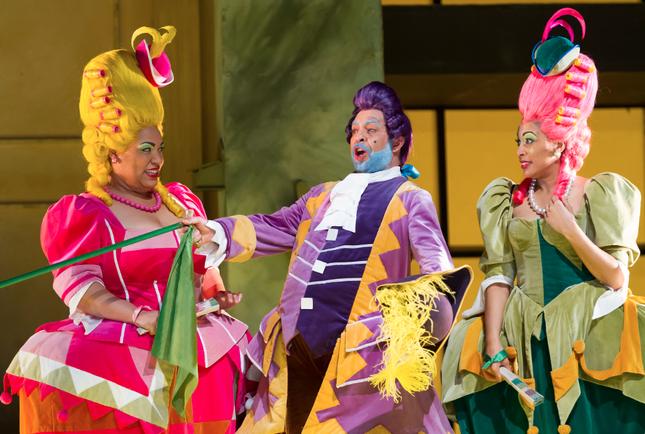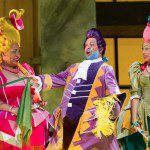Lively Pairing: Evil Stepsisters of ‘Cinderella’
By • May 21, 2015 0 1197

There’s still another chance—Thursday at 7:30 p.m. at the Kennedy Center Opera House—to see “Cinderella,” a revival of Rossini’s classic romantic comedy, and a number of reasons to take the opportunity.
This version of the French fairy tale spins happily along with any number of audience treats. There’s the blazingly colorful costumes. There’s the lively Rossini music, the thrilling and trilling vocalizing by a top-notch cast. There’s Don Ramiro, an appealing prince, and Angelina (aka, Cinderella, aka La Cenerentola), an appealing heroine, and an outrageous villain (appropriately named Don Magnifico).
But there’s more — two more to be precise. Two young performers who add a major portion of the fuel for the high-dudgeon energy of “Cinderella” are also two good reasons to laud the effectiveness of the Washington National Opera’s Domingo-Cafritz Young Arts Program. That would be American soprano Jacqueline Echols and American Mezzo-soprano Deborah Nansteel, who take on the gaudy parts of Cinderella nemeses, the stepsisters Clorinda and Tisbe, respectively..
Both Echols and Nansteel had already built an impressive list of credentials, including appearances at the Washington National Opera and at the Glimmerglass Opera Festivals in Cooperstown, New York, where WNO Artistic Director Francesca Zambello is also in charge.
“The sisters are just terrific parts,” said Echols, who is a Detroit native. “You really an opportunity to emote, and I’m sure it looks like we’re having a great time, which we are. But the vocals, the music, the singing in tandem together and with other characters, that’s really difficult music.”
“The sisters are great roles,” Nansteen said. “And those costumes, those wigs, wow. You have to be able to really work together, and in the sense of this production, we operate like sisters. We get along really great.”
Even in a telephone interview, you can differentiate their voices, which operate on the thin no-man’s land between soprano and mezzo. Nansteen’s voice a shade lower.
Both began their careers in the Domingo-Cafritz Young Artist Program. Echols appeared with the WNO as Musetta in “La Boheme” (a Domingo-Cafritz performance) in the American Opera Initiative, as the Water in “The Little Prince,” covered the role of Pip in “Moby Dick” and was First Lady in “The Magic Flute.”
Nansteen sang the title of “Penny” in WNO’s American Opera Initiative and was Curra in ‘The Force of Destiny” and was Third Lady in “The Magic Flute.”
Watching the two singers and listening to the two, you can imagine them as real sisters, even though each had a different journey to the world of opera. Thoughts about jazz, listening to chorus music, gospel and the art of acting in opera intermingle in their conversation. They both agree that acting is important, especially in contemporary opera. As the sisters, Echols and Nansteen prove their point—they are masters of the singing, and they dive with relish into the more obvious comedy. But, somewhere, you see the sisters as sisters, and as real people, or as real as opera characters get.
The Washington National Opera’s “Cinderella” runs through May 21 at the Opera House of the Kennedy Center for the Performing Arts.
- Evil stepsisters Deborah Nansteel and Jacqueline Echols with Paolo Bordogna as Don Magnifico in the Washington National Opera production of “Cinderella” at the Kennedy Center. | Photo by Scott Suchman




